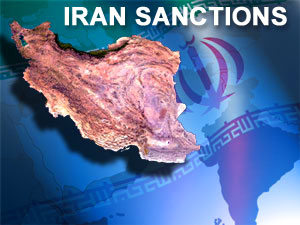New U.S. economic sanctions against Iran will backfire
By William O. Beeman New America Media | Last updated: Oct 1, 2009 - 1:42:24 PMWhat's your opinion on this article?

Graphic: MGN Online
The most foolish of the U.S. measures is a proposed resolution to embargo gasoline imports to Iran. Lobbyists who oppose Iran and its policies have told Congress that Iran does not produce enough gasoline for its internal needs, and must import it from abroad. The Iranian government aims to completely eliminate gasoline imports by 2013 ... |
NEWS ANALYSIS
The U.S. sanctions provide cover for stern, unpopular economic measures the Iranian government wants desperately to enact, but can't in the current political climate. Having the United States to blame makes these moves justifiable to the restive Iranian public, already in turmoil over the contested July 12 presidential election.
The most foolish of the U.S. measures is a proposed resolution to embargo gasoline imports to Iran. Lobbyists who oppose Iran and its policies have told Congress that Iran does not produce enough gasoline for its internal needs, and must import it from abroad. This is true.
What the U.S. Congress does not understand, however, is that the Iranian government subsidizes the gasoline it imports so the cost to the public is roughly 10 cents per liter, or just short of 40 cents per gallon. The cost is ruinous and the government has acted to curb the costs. In 2007 the government imposed rationing on the public —100 liters per month for individuals and 600 liters per month for taxicabs and other transport vehicles. Moreover, a program of equipping vehicles for natural gas is well underway. The free market is also active. For those who need more than the allotted 100 liters of gasoline, it can be purchased on the open market for approximately $2 (U.S.) per gallon.
The Iranian government aims to completely eliminate gasoline imports by 2013, and it is making significant progress toward that goal. In order to progress, they would like to introduce further rationing, and transfer gas purchases gradually to free-market prices. However, they know that they will meet tremendous public resistance. When rationing was initially introduced, there were public protests, and threats of public transportation strikes.
In this light, the U.S. Congress' call for sanctions allows the Iranian government to further ration gasoline and blame America for the need to do it.
Of course, American calls for an embargo are futile anyway, and the Iranian leaders know very well that pointing fingers at the United States to justify rationing would be a cynical charade. Gasoline is sold through independent brokers worldwide. These are private entrepreneurs operating under very few restrictions. The idea that any U.S. measure would stop gasoline imports into Iran is a practical absurdity, short of blockading the Straits of Hormuz, the entrance to the Persian Gulf.
Other sanctions have made life somewhat more uncomfortable for the Iranian middle and lower economic groups, but they have not stopped banking or trade. Anything available in the United States is also available in Iran, albeit at elevated prices. When prices go up in Iran due to inflation resulting from bad government economic policies, once again Iranian leaders blame the United States.
Related news:
Video: Iran President Mahmoud Ahmadinejad address to UN (09-23-2009)
Were Iranian nuclear documents fabricated? (FCN, 09-25-2009)
FinalCall.com News
INSIDE STORIES AND REVIEWS
-
-
About Harriett ... and the Negro Hollywood Road Show
By Rabiah Muhammad, Guest Columnist » Full Story -
Skepticism greets Jay-Z, NFL talk of inspiring change
By Bryan 18X Crawford and Richard B. Muhammad The Final Call Newspaper @TheFinalCall » Full Story -
The painful problem of Black girls and suicide
By Charlene Muhammad -National Correspondent- » Full Story -
Exploitation of Innocence - Report: Perceptions, policies hurting Black girls
By Charlene Muhammad -National Correspondent- » Full Story -
Big Ballin: Big ideas fuel a father’s Big Baller Brand and brash business sense
By Bryan Crawford -Contributing Writer- » Full Story






 Click Here Stay Connected!
Click Here Stay Connected!








